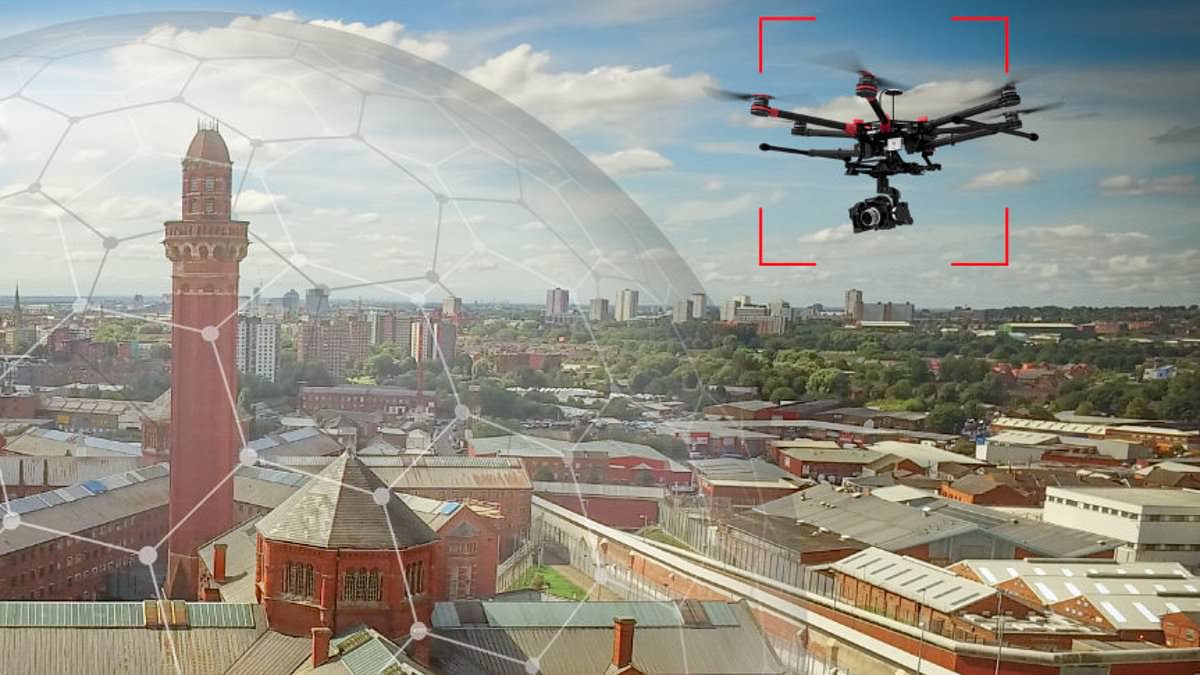Electronic forcefields could be used to block drones carrying drugs into prisons across the UK.
The technology, which is being used in a prison in Guernsey, is being evaluated by Home Office experts.
In the past seven years the technology has stopped drones smuggling drugs, phones and contraband into the prison.
It works by detecting drones within a 50 metre radius of the outer walls and activates a ‘sky fence’ which blocks signals between the drone and the operator.
This comes after Chief Inspector of Prisons Charlie Taylor said police and jail chiefs have ‘ceded the airspace above two high-security prisons to organised crime gangs’ amid huge numbers of illicit drone flights.
He said drones delivering drugs and weapons into jails posed a ‘threat to national security’.
He also found that drones were even delivering mobile phones and takeaway meals to prisoners.
A Home Office team held a meeting with John De Carteret, governor at Guernsey’s Les Nicolles prison, last week for a briefing on the system, The Telegraph reported.
Mr De Carteret said he had been contacted by both the Home Office and the Scottish prison service.
He said the system, created by Drone Defence, and its 100 per cent reliability had become a deterrent for attempts by gangs to smuggle using drones.
He said: ‘My personal view is that it is not very long before a firearm is taken into a prison which will enable a huge incident involving concerted indiscipline or an escape attempt.
‘Telling people and publicising what we have got has been a bigger mitigating factor than anything else.’
In order to use the technology, Guernsey tweaked the UK’s Wireless Telegraphy Act by adding drones to a clause which allows prisons to jam mobile phone signals.
Prison authorities were also told by lawyers that operators would be legally at fault for any injuries caused by a falling drone.
The forcefield does not have an affect on nearby wifi or mobile phone signals from anyone walking close to the prison.
One high-security prison is being swarmed by so many drones it is like an ‘airport’.
At HMP Garth in Lancashire more than a dozen cells had holes in their windows, which had been burnt by inmates using the element from their kettles. They then use mops and brooms to haul in illicit substances hanging down from drones hovering outside.
HMP Garth houses 816 prisoners mostly serving long or indeterminate sentences and is intended to be a training prison that provides education for inmates.
However, it was unable to fulfill this role due to many prisoners being locked in their cells for much of the day in an attempt to reduce rampant violence.
HMP Manchester, formerly known as Strangeways, is getting extra staff and ‘bolstered security measures’, including netting to stop drugs being flown into the jail by drone.
Prisons minister Lord Timpson said Manchester – the scene of a major riot in 1990 – will have new CCTV and anti-drone netting installed.
Shadow justice secretary Robert Jenrick urged ministers to pursue all options to counter the drone threat.
A Ministry of Justice source told the telegraph they are not actively considering the Guernsey-based system and said the meeting was part of a wider assessment of anti-drone technology.
